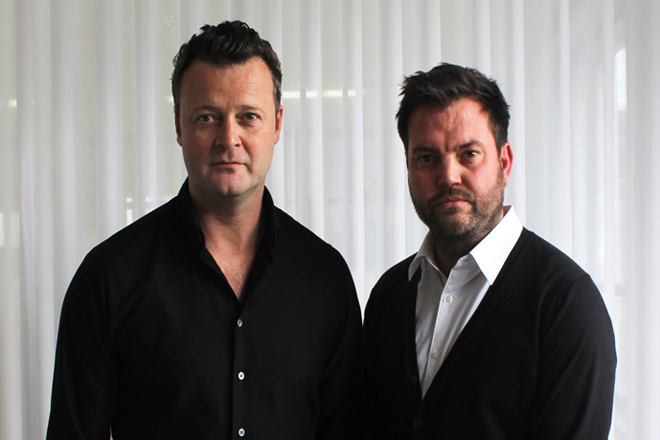Straight talking design duo, Nick Stringer and Matt Smith, are the creative minds behind acclaimed interior design practice, Shed. From their striking pyschedelic designs for international restaurant chain, MEATliquor, to an Andy Warhol-inspired cocktail bar in East London, the practice has designed and developed highly successful projects in over 30 countries …
How did you forge a career in the industry, and what was it that first drew you to the design sector?
MS: I guess I jumped through the usual hoops involving art foundation and a degree course and then it was a case of applying and freelancing until, like number 73 buses, three design job offers came at once.
My foundation course was what really opened my eyes to product, furniture and interior design.
Who was inspirational to you early on in your career, and why?
MS: John Pawson. My degree fell into a period where postmodernism was been questioned and modernist approaches were been adopted again. It just felt like an exciting time to be a designer.
NS: My uncle and auntie moved to London in the late Sixties and besides his music career Rob (my uncle) worked for several architectural practices. They have lived in the same Barbican flat more or less permanently ever since. I used to visit from Sheffield in school holidays and to me Barbican was a fantastic place to stay, totally different from home and to this day it still amazes me.
We used to drive around at night looking at buildings he was working on and just take in the city. I’d have to say they were both a big inspiration in that respect and still are.
How did Shed come about?
NS: Like most new businesses I’ve known, via a spare bedroom office, two Macs and a lot of time in the pub.
MS: Nick and I had said we should do something together three years prior to starting. We had worked at opposite sides of the world for a while and then in 1999 we were both in London and it felt right. We worked from a bedroom for a while before we managed to get offices in central London.
What would you say are Shed’s defining philosophies?
NS: We’d like to think we’re straightforward guys and say it how it is. You’ve got to be yourself haven’t you (?) and it’s worked more often than not. Although not planned we don’t have a ‘house style’ because we work across all types of business and sectors. Everybody needs something different and to do that you have to change your approach.
How did the MEAT story begin?
MS: Scott Collins, one of the founders, was an old friend and we had already started talking when MEATeasy had opened. We did a Shed sampling night down there and met Yianni the other founder who introduced us to the dead hippy (burger). Needless to say we were hooked and when the first site came along the concept was well under way.
Which hospitality project are you most proud of/stands out in particular to date?
MS: I like the original MEATliquor as it captures that moment in time and the start of a philosophy that has become synonymous with the MEAT brand.
NS: The MEAT projects stand out because they were our first big push into F&B and the client gave us a chance to do something very different. The queues for MEAT still stretch around the block and there’s a real energy to those places. MEAT in Leeds makes me laugh because it’s a working mens club meets northern soul vibe which is quite tongue in cheek, but as fellow Yorkshiremen if we can’t do it, who can?
HOTBOX and its sister bar 46 & Mercy are brilliant new clients too. We hope to do more with them.
Do you feel that hospitality clients’ expectations have changed over the years?
NS: I think the F&B sector in particular is always demanding, never more so than now because the competition is so fierce. Everything has to be different, everybody is trying to reposition or re-invent.
This applies to hotels too, If we had a pound for every time a new client mentioned Shoreditch House – but that’s born out of seeing a reliable and very successful formula grow. Many clients think those guys just threw it together but that’s a big misconception for new entrants.
What themes do you envisage becoming more important to the hospitality sector over the next few decades?
NS: I’d like to see more done with really cool low(er) cost hotel accommodation. Access to brilliant parts of the world seem to go with a big hotel price tag. I quite like what Hoax have started to do in Liverpool.
Have you got any hospitality projects in the pipeline that you’re able to share with us?
NS: We’ve started to work on a French Bakery offer which I think will be a big rival to the established players, plus we just completed MEAT Singapore which opens new avenues in the Far East, a part of the world where we are quite well established already due to my Prada history and retail roll-outs over the years.
How do you envisage the practice evolving over the next 10 years?
NS: I think we are looking to get a signature hotel project under our belts and expand the F&B side of the business. Essentially though we’re a modest sized studio and we like it that way. Growing too big isn’t our plan because you lose focus and quality. We’ve always designed different things, that’s what’s exciting and we’ll continue to do the same.
Design is a profession and as such you can’t choose what walks through the door, but you still have an obligation to take it on face value and do a job, that’s what we do. Being open minded has let us work on a real mix of projects and that’s how we like it.



